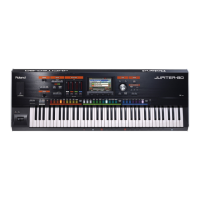The "JUPITER" name has become synonymous with innovation
and state-of-the-art design that's built for the future.
Since the game-changing debut of JUPITER-4 in 1978, all synthesizers anointed with
the "JUPITER" badge have symbolized the state of the art, and have ushered in new
creative possibilities as Roland's flagship synths. Today, the flagship JUPITER-80 has
evolved into Version 2, while the JUPITER-50, represents the expressive sound of the
JUPITER-80 in a more lightweight and affordable package. Both of these
new-generation instruments mark new milestones in the JUPITER lineage.
Live Sets are made by overlaying up to four SuperNATURAL
tones to achieve fat and heavy sounds with unique
expression. Live Sets that are mapped to the upper and
lower registrations in JUPITER-80, and the upper registration
in JUPITER-50, can be saved as "Registrations." You can
retrieve these registrations instantly for handy access during
live performance.
Taking advantage of Behavior Modeling technology,
SuperNATURAL is Roland's exclusive sound set that achieves
a new level of realism and expression that were difficult to
realize with previous sound generators.
The JUPITER-80 and -50 are powered by SuperNATURAL,
offering mind-bending synthesis and surreal sound as well
as natural, true acoustic tones that reproduce the playing
expressions unique to acoustic instruments.
Not only physical modeling of the instruments, Roland takes
it a step further by modeling the instrument's distinctive
behavior that responds to how the performer plays, resulting
in true-to-life, expressive sounds in realtime.
Behavior Modeling
Technology
SuperNATURAL
New Possibilities with
Live Sets and Registrations
1978 — Roland's first polyphonic analog
synthesizer (4 voices). The 4VCO sound in
unison mode is superb, and it also has a
user patch-memory function built in.
JUPITER-4
1981 — A deluxe 8-voice polyphonic analog
synthesizer with 64 memory locations.
Its smorgasbord of features, including key split, patch
preset, and auto arpeggio, earned this synth global
praise and legendary status.
JUPITER-8
1983 — Scaling down the JUPITER-8 to 6-voice polyphony,
coupled with creative tweaking by Roland's engineers,
allowed the JUPITER-6 to hit the market at half the price
of its big brother. It also made news with its MIDI terminal
and highly stable oscillator.
JUPITER-6

